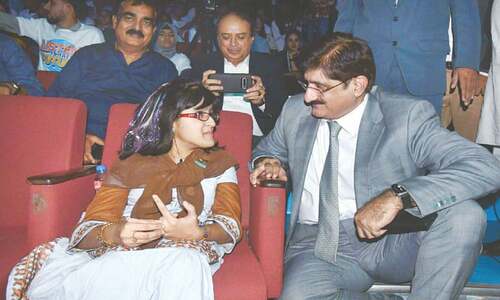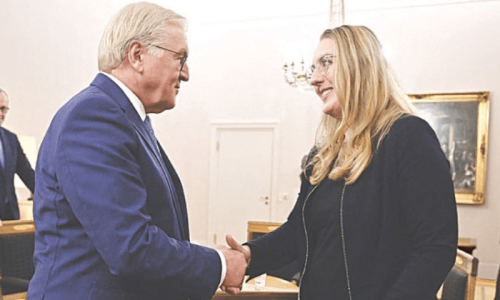 KARACHI, July 15: Quetta was known as Little London during the British rule. Today, this once thriving city has become a land of turmoil and political disharmony, where violence, bomb blasts and unrest have become an everyday scenario.
KARACHI, July 15: Quetta was known as Little London during the British rule. Today, this once thriving city has become a land of turmoil and political disharmony, where violence, bomb blasts and unrest have become an everyday scenario.
The premiere of The Weeping Queen, a docu-drama depicting the glorious past and ugly present of Quetta, was screened at a local hotel on Monday. According to the film’s writer, director and producer Talha Ghaznavi, the film is an anguished voice calling for help.
Nestled in a valley surrounded by mountains, the capital of Balochistan has the Chiltan range on one side of the city. One of the mountains is shaped like a sleeping woman and this is where the story begins. Zeba Bakhtiar plays the main role of the sleeping woman who takes on a human form, symbolizing Mother Earth, who brings the city of Quetta to life while journeying through its past, present and future. There are small enactments of historical events and Zeba Bakhtiar as Mother Earth is seen commenting on them.
In the welcome speech, Talha Ghaznavi said the sleeping woman, known as the Chiltan Queen, had intrigued him for a long time and what was visualized as a documentary initially developed into a docu-drama.
“We take so much from the land but we don’t give anything back. Quetta – a border city – is full of history. It has welcomed newcomers, borne the brunt of armies and colonization, suffered a severe earthquake and yet survived all this, continuing to sustain everyone and remaining peaceful, strong and steadfast all the while,” the director said.
He revealed that the docu-drama was an indigenous production with the artist, editor and cinematographer belonging to Quetta as well, hence there is depth of feeling for the topic by everyone involved in the project.
Sindh Minister for Information Shazia Marri, who had walked in late and missed most of the film, congratulated Mr Ghaznavi on the film and what it stood for, but said she disagreed with some of the points in the film as some of the causes of the problems were not shown.
Replying to Ms Marri, the director said The Weeping Queen was not a political statement; it was about the soul of the land, a historical document on Quetta as a city.
The premier for the moment had turned into a dialogue when the information minister, who has also lived in Quetta, shot back saying that the documentary did not show the deprivation of the people as well as the reasons for the present situation.
The chief guest, Sindh Assembly Speaker Nisar Khuhro, seemed to save the situation when he was invited to speak. He said the documentary should be shown internationally. He praised Zeba’s acting and said the director had depicted the land as the weeping queen, and its soul was the people. “Showing history in 50 minutes is not easy. We should be optimistic and hopeful about the land. Talha Ghaznavi has done a good job.”
As the story begins Zeba Bakhtiar is seen getting up from the mountain and states Quetta was known as Shalkot, which means chador, which protects everyone and people of all religions lived in harmony. Gradually, as the city’s problems grow, from the time of the Soviet invasion of Afghanistan and the influx of refugees and drugs, gun culture and violence, she starts to wither.
Zeba Bakhtiar’s acting is good; what is lacking is her vocal intonation, which seems to quiver and thus jars the impact of what she is saying.












































Dear visitor, the comments section is undergoing an overhaul and will return soon.